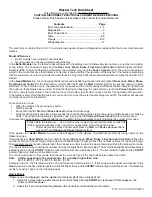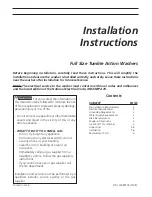
10
NOTE:
The GFCI may need to be reset when first plugged
into the electric outlet. Press the "Reset" button until
the power light indicator on the GFCI illuminates when
plugged in.
5. Turn the water supply tap on completely.
6. Release the safety lock, then press the trigger for a few
seconds until the water flow is steady. Operating the
pressure washer in this manner will allow air to escape
and discharge residual pressure in the hose (Figs. 13 – 14).
7. Turn the ON/OFF switch to the ON (I) position to start the
pressure washer (Fig. 15).
Fig. 15
ON/OFF switch
8. When re-starting the motor, always keep the trigger
pressed.
NOTE: The motor only runs when the trigger is operated
and shuts off when the trigger is released.
Using Nozzles
Before beginning any cleaning task, determine the best nozzle
for the job. Each of the nozzles has a different spray pattern.
The nozzle patterns are 40˚ (for gentle cleaning), 15˚ (for tough
jobs), and 0˚ (for spot cleaning or hard-to-reach areas) .
m
CAUTION!
NEVER change nozzles without locking the
safety lock on the trigger handle.
m
WARNING!
High-pressure jets can be dangerous if
subject to misuse. The jet must not be directed at persons,
pets, live electrical equipment, or the appliance itself.
This electric pressure washer is equipped with three (3) Quick-
Connect nozzles that easily snap onto the Quick-Connect
collar of the spray wand.
To connect a nozzle to the spray wand:
1.
Turn off the pressure washer and shut off the water supply.
Pull the trigger to release water pressure.
2. Engage the safety lock on the trigger handle.
3. Pull back the brass Quick-Connect collar and insert the
desired nozzle into the collar. Release the collar and the
nozzle will click into place (Fig. 16).
Fig. 13
Safety lock
Fig. 14
Trigger











































